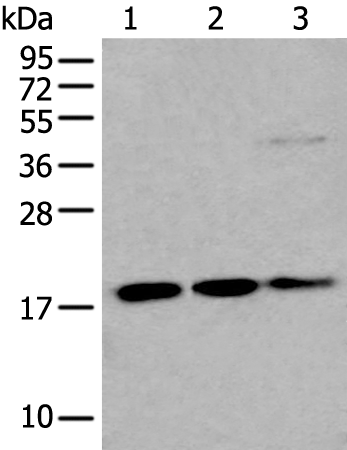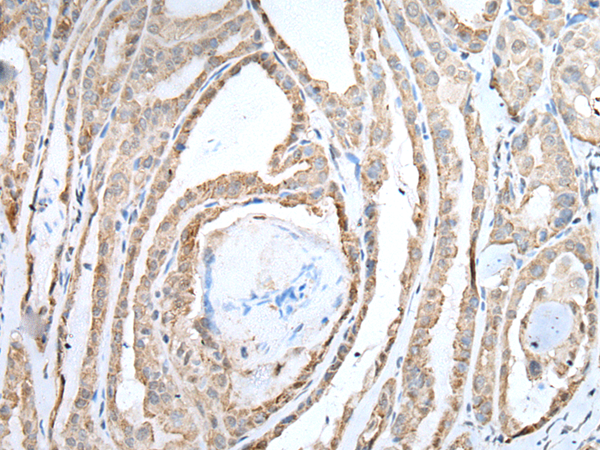

| WB | 咨询技术 | Human,Mouse,Rat |
| IF | 咨询技术 | Human,Mouse,Rat |
| IHC | 1/25-1/100 | Human,Mouse,Rat |
| ICC | 技术咨询 | Human,Mouse,Rat |
| FCM | 咨询技术 | Human,Mouse,Rat |
| Elisa | 1/5000-1/10000 | Human,Mouse,Rat |
| Aliases | UBCH10; dJ447F3.2 |
| WB Predicted band size | 20 kDa |
| Host/Isotype | Rabbit IgG |
| Antibody Type | Primary antibody |
| Storage | Store at 4°C short term. Aliquot and store at -20°C long term. Avoid freeze/thaw cycles. |
| Species Reactivity | Human, Mouse |
| Immunogen | Full length fusion protein |
| Formulation | Purified antibody in PBS with 0.05% sodium azide and 50% glycerol. |
+ +
以下是关于UBE2C抗体的3篇参考文献及其摘要概括:
1. **"UBE2C promotes tumor progression via Wnt/β-catenin signaling in colorectal cancer"**
- **作者**: Li, J., et al.
- **摘要**: 该研究通过免疫组化(使用UBE2C抗体)发现UBE2C在结直肠癌组织中高表达,并与患者预后不良相关。实验表明UBE2C通过激活Wnt/β-catenin信号通路促进肿瘤增殖和转移。
2. **"Development of a monoclonal antibody against UBE2C for cancer diagnosis and therapeutic evaluation"**
- **作者**: Wang, Y., et al.
- **摘要**: 研究团队开发了一种特异性识别UBE2C的单克隆抗体,验证了其在乳腺癌细胞系和组织中的检测效果,并证明UBE2C抗体可用于评估靶向UBE2C的抑制剂治疗效果。
3. **"UBE2C as a therapeutic target in triple-negative breast cancer"**
- **作者**: Smith, K., et al.
- **摘要**: 利用UBE2C抗体进行功能抑制实验,发现沉默UBE2C或使用抗体阻断其活性可显著抑制三阴性乳腺癌细胞的体外侵袭和体内成瘤能力,提示其作为治疗靶点的潜力。
4. **"UBE2C overexpression correlates with genomic instability in pan-cancer analysis"**
- **作者**: Gupta, R., et al.
- **摘要**: 通过UBE2C抗体检测多种癌症样本,发现UBE2C过表达与基因组不稳定性(如染色体非整倍性)显著相关,可能作为泛癌种预后标志物。
这些研究均利用UBE2C抗体探究其在癌症中的作用机制或临床应用价值。
UBE2C (Ubiquitin-Conjugating Enzyme E2C), also known as UBCH10. is a member of the E2 ubiquitin-conjugating enzyme family. It plays a critical role in the ubiquitin-proteasome system by transferring ubiquitin to target proteins, marking them for proteasomal degradation. UBE2C is particularly essential in cell cycle regulation, where it interacts with the anaphase-promoting complex/cyclosome (APC/C) to mediate the degradation of mitotic regulators like cyclins and securins, ensuring proper progression through mitosis. Dysregulation of UBE2C has been linked to genomic instability, uncontrolled cell proliferation, and cancer progression. Overexpression of UBE2C is observed in various malignancies, including breast, lung, and colorectal cancers, and is often associated with poor clinical outcomes, chemotherapy resistance, and metastatic potential.
UBE2C antibodies are essential tools for studying its expression, localization, and function in both normal and pathological contexts. These antibodies are widely used in techniques such as Western blotting, immunohistochemistry (IHC), and immunofluorescence (IF) to detect UBE2C protein levels in tissues or cell lines. Researchers also employ UBE2C antibodies to explore its role in cancer biology, therapeutic targeting, and as a potential diagnostic or prognostic biomarker. Validated antibodies are crucial to ensure specificity, often confirmed through knockdown experiments or recombinant protein controls. Given its involvement in oncogenesis, UBE2C remains a focus for developing small-molecule inhibitors or antibody-based therapies aimed at disrupting its activity in cancer cells.
×